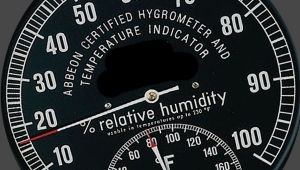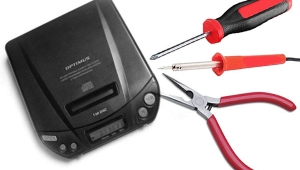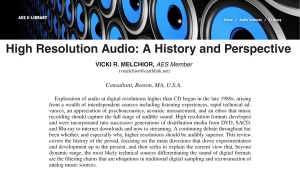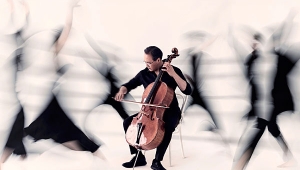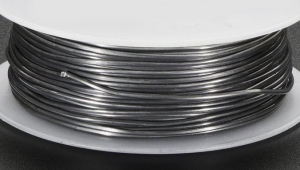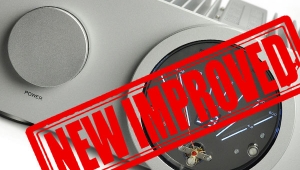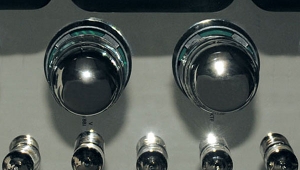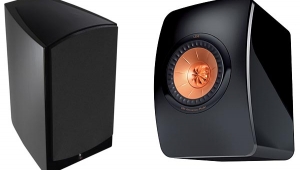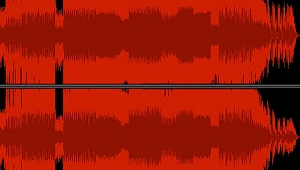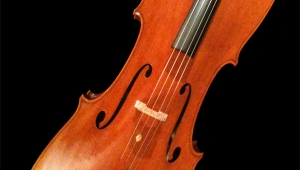| Columns Retired Columns & Blogs |
Digital Idealism vs Analog Realism
"Digital is superior," proclaims Mr. Alberto Arebalos in February's "Letters." I'm glad that's settled. Still, I'm typing this ten feet from a wall lined with LPs, Don Patterson's Satisfaction! is spinning on the old Systemdek turntable, and my usually cold, drafty Chicago apartment seems like a summer night at the Green Mill Jazz Club. But I agree: digital is superior. What's wrong with me?
The main problem Mr. Arebalos sees in vinyl is simple. "With physical contact between the stylus and the disc, you are going to have degrading performance along the way, despite all the care with which you treat your discs." LPs, cutters, and phono cartridges are just the wrong tools to use for recording and reproducing music. Every bobsled ride your stylus takes through a record degrades the precious information it contains. "I do not believe clicks and pops are part of high fidelity." CDs, on the other hand, don't involve wear and tear. Light bounces off the disc harmlessly to reveal the ones and zeros embedded within. No physical contact (except for the light, of course), no pops and clicks.
So why don't I give my groaning shelves a break, unload those LPs, and put my vinyl-scratching turntables out to pasture? There are a lot of reasons. One of them is that Mr. Arebalos' argument doesn't persuade me to. It reminds me of a discussion I recently had with my friend Jack, a design engineer and LP fan. He's hunting for a good direct-drive turntable on the used market.
"Why not a belt-drive?" I asked.
"Because the engineering is more elegant," he explained. "There's no belt to wear out; there are fewer parts; it's simpler."
"But then why do belt-drive turntables sound better? All the heavy hitters—Linn, VPI, Well Tempered—are belt-driven."
He scratched his bearded chin. "Are they?"
Sometimes the best ideas for how to build something don't lead to the best result.
What's so very wrong about physical contact between a stylus and a groove? In this age of digital information we're supposed to believe that the more computerized and "virtual" something is, the better it is. As for musical instruments, the race is on to replace their physical and mechanical properties with computerized simulations. According to the New York Times of January 19, 1999, Research at Stanford University and IRCAM, the Institute for Research on Acoustics and Music in Paris, has started to unravel exactly what goes on inside a flute, say, that makes it sound so different from an oboe or recorder. It has everything to do with physics—the physics of air currents within the contours of the instrument. In a recorder, the IRCAM group found, the player's breath hits a sharp edge and begins to oscillate, which in turn excites larger vibrations within the instrument. Finally, tiny vortices of air curl off this edge to create the overtones that give a recorder its distinctive sound.
By liberating these physical processes from their very physicalness, tomorrow's synthesizers will have new powers. Better than putting digital recordings of actual instruments inside a keyboard, the keyboard will itself become a computer that virtually mimics these physical processes. As a technological goal, all this makes sense. The physics of acoustic instruments has long been poorly understood from the scientific point of view, if not by the craftsman. The mountain is there, so some of us will want to climb it (and make money from it).
But is digital "superior" when it comes to musical instruments? If the complex vortices and vibrations that make, say, Branford Marsalis' saxophone sound like it does can be simulated inside a keyboard, will that be better for Branford Marsalis and those who like his playing? Mr. Arebalos' point of view suggests that it would be. After all, no longer will he have to swing that ungainly metal contraption from his neck; no longer will it get spitty and sweaty, or wear out from the physical battering it takes night after night.
Gone, too, will be the vagaries of microphones and room acoustics, for his virtual horn could be plugged directly into a console. Just as harmless beams of light have replaced the vibrations of a stylus, digital simulations can replace the buzzing reeds and clattering keys of a sax. But it just doesn't seem appealing, does it? Even the most ardent champions of digital would become "Luddites" if they preferred to hear musicians playing old-fashioned, physical instruments.
Take digital photography (please). If digital is superior, digital cameras should be better than the old-fashioned kind. Just as dragging a stylus in a groove damages the very information that is being recovered, clicking the shutter of a film camera sets up vibrations just when the lens and film need to be motionless. It's obviously simpler and more effective to capture an image by electronically activating a panel of phototransistors. But it's hard to believe that digital is superior when snaps from even professional-quality digital cameras are so dismal. Compared to snaps from ordinary 35mm cameras, they look like bad CD players sound: grainy, harsh, and electronic.
Or take books (please don't). What better for our planet's trees, for students' backpack-ruined postures, and for libraries short on space than to replace books with CD-ROMs or downloadable HTML files? Digital books are far superior to the old-fashioned kind. But who really wants to lean into a computer monitor instead of curling up in a favorite easy chair? Who wants to read a great novel in bed, only to nod off with a glowing LCD screen lying on their chest?
Even if some of digital's biggest fans agree with my polemic about photography, books, and musical instruments, others will insist that I'm just trotting out exceptions to the rule that digital is superior. We're used to film cameras and old-fashioned books, they'll say, just as vinyl-loving Luddites like me are used to the sound of LPs. That's why we like them. But for future generations, they'll say, everything will be digital, and should be. Why? Because digital is superior.
Will this circle of logic ever be broken? Not easily. It's spun from the seductive logic of idealism, one of the sorriest blind alleys in the history of metaphysics. For idealists, ideas are primary. They are the fundamental ingredient of the world—they determine the way the world is, and how we experience it. Mr. Arebalos says that the idea of recording and retrieving musical information digitally is better than the idea of dragging a stylus through a groove. I agree. But I don't accept his argument that, because of the supremacy of this idea, actual CD players sound better than actual turntables.
Why not? Because ideas are one kind of thing, CD players and turntables are another. I'm a realist. For me, material objects and electronic devices exist in themselves, independently of our ideas about them. At best, our ideas reflect, or correspond to, the world. They don't determine the way it is, and they never will. As Hamlet put it, "There are more things in heaven and in earth, Horatio, than are dreamt of in your philosophy."
I admit that there is some evidence for idealism. The world we know is, in some ways, directly a product of our minds and senses. Each of us, for example, has ideas about colors—that some things are red, others blue, etc. But colors don't really exist as such a discrete set. Instead, there's a smooth, continuous electromagnetic spectrum out there. But our eyes, nerves, and brain parse that spectrum into the neat little packets that we call "red," "blue," and so on. These separate colors seem real and objective, but in fact we "make it so," as Jean Luc Picard would say. Point for idealism.
But realism soon pulls ahead. How do we know that God's paint box did not include tubes labeled "red," "green," and so on? From science, from empirical investigation of the world that is premised on realism—on the fact heaven and earth far outstrip our ideas. We have to perform experiments to find out, despite our ideas, what the world is really like. Two points for realism.
For those historically inclined, much of this debate comes from the 18th-century philosopher George Berkeley (1685–1753). In Berkeley's day, Isaac Newton's star was rising, and his physics was recognized as a premier intellectual achievement. But Berkeley had doubts. He was uneasy with the realist view that matter existed all by itself, for that would mean that the material world had a life of its own, apart from our ideas about it. No idealist will go there.
Berkeley rolled up his sleeves and set out to convince us that Newton and others were wrong about matter—that it didn't really exist independently of us. Had he argued with Newton, it might have gone something like this:
Berkeley: Sir Isaac, have you ever seen a piece of matter?
Newton: Of course I have.
Berkeley: Are you also sure that matter exists all by itself, and that its existence has nothing to do with your perceiving it?
Newton: Um...excuse me. I fear I do not understand.
Berkeley: I mean, Sir, can you be sure that the existence of a chunk of matter that you happen to perceive does not gain its existence from your very act of perceiving it?
Newton: Are you asking if I have perceived matter without, at the same time, perceiving it, so that I can be sure that I myself am not the source of its existence?
Berkeley: Yes, that is exactly what I ask.
Newton: Well then, the answer must be no. I cannot both perceive something and also not perceive it, can I?
I told you this was a dead-end argument. (If you don't believe me, check out Berkeley's classic "Three Dialogues between Hylas and Philonous" (1713) in any volume of his works.)
Berkeley didn't think that matter just popped in and out of existence depending on whether Newton (or anybody else) was perceiving it. But God was another story. For Berkeley, God maintained the existence of the material universe by constantly perceiving all of it, everywhere, at every moment in time. Our perceptions of material objects, then, were a byproduct of God's own. God was the paradigmatic idealist. Were His mind to slip, were He to think even for a moment about something besides the material universe, it would pop right out of existence like Charlie Brown in a spelling bee.
Your Philosophy 101 professor was right: everyone is a philosopher. Vestiges of this classic debate are right between the lines of Mr. Arebalos' letter. If he's right that, since digital is superior to analog, actual CD players sound better than actual turntables, there must be some explanation for why all of us Luddites adamantly defend our favorite obsolete technology. Mr. Arebalos offers one: "Maybe in the prehistory of CD," he writes, "vinyl could sound or be perceived as sounding better." But, he implies, it wasn't really better—it just may have seemed to be. Berkeley drew the same distinction between appearance and reality: matter seems to exist all by itself, but it really doesn't.
Berkeley died an idealist, but Mr. Arebalos is sobering up. He closes his letter by proposing an empirical test in which experts A/B some analog and digital equipment and judge which sounds better. I'm all for it, Mr.. Arebalos, but I doubt that your test will prove that we vinyl-loving Luddites are "trying, once again, to move backward the evolution of audio." In the realm of ideas, digital is indeed superior. But that doesn't mean CDs necessarily sound better than LPs, or that your experiment will turn out the way you expect.
- Log in or register to post comments

